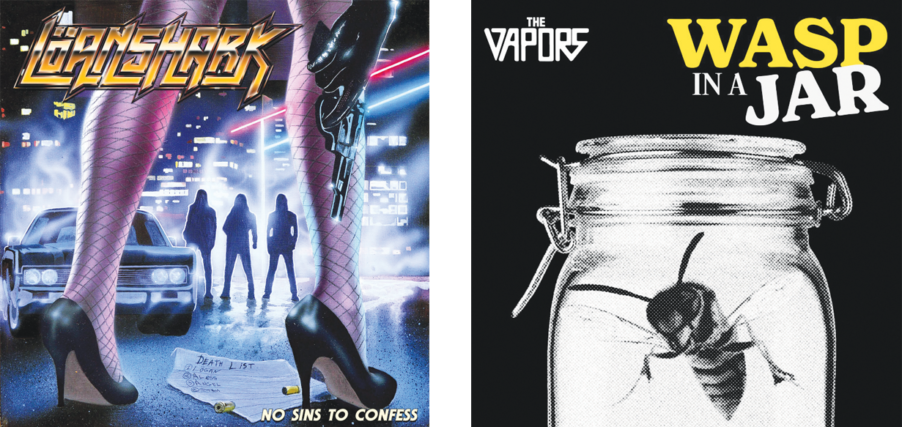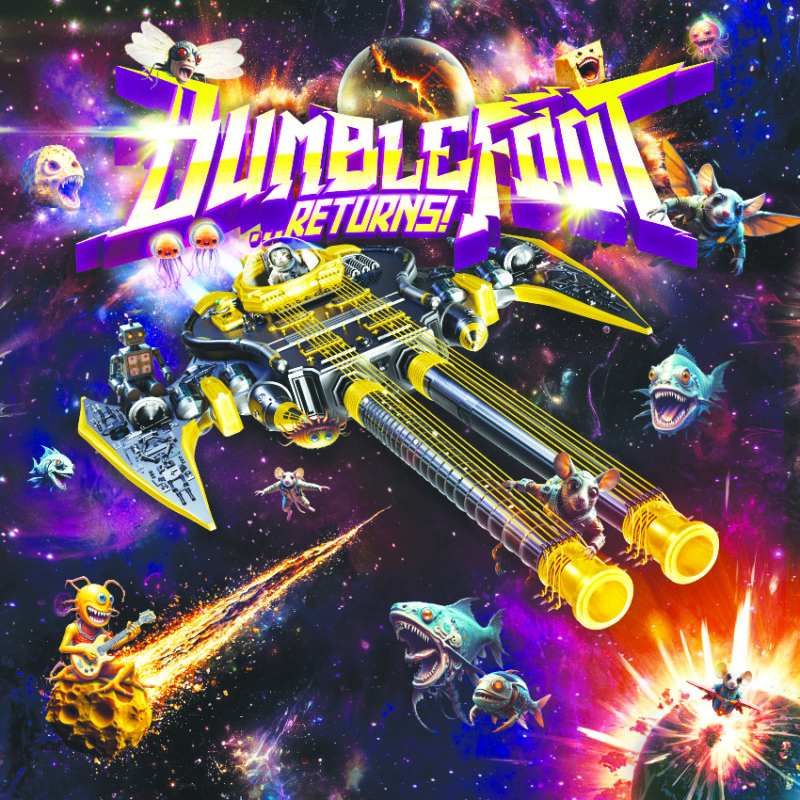Löanshark, No Sins To Confess (Reigning Phoenix Music)
I swear I haven’t developed some weird fetish for foreign heavy metal bands, cross my heart; you may have noticed that I pick a random metal band out of my overstuffed emailbox every few weeks, and it just so happened that this week it’s yet another entry from Barcelona, Spain. I can make this short and sweet: If you ever wanted to hear what it would sound like if Scorpions and Alcatrazz had a baby, it’s this. The old-school hamster-wheel gets spinning really fast from the jump, with opener (no, I’m not making this up) “Electric Shockin’ Waves,” a headbanger that doesn’t break any new ground at all but nevertheless is a fine attempt; the singer sounds like a cross between Klaus Meine and Dio, which is about as generic as things could get. In case you’re not sure what this is about, there’s a cover version of NWOBHM cult band Marseille’s“Open Fire” that sounds a lot like a forgotten hit from Europe, come to think of it. It’s OK! A —Eric W. Saeger
The Vapors, Wasp In A Jar (Vapors Own Records)
Holy crow, stop the presses, this isn’t stupid at all! I know it must be a shock to Gen-Xers (how’s the imminent approach of your 60s feeling, kiddies?) to find that this U.K. New Wave band is still at it; you oldbies remember their big (OK, only) hit “Turning Japanese” from wayyy back in the day, but fact is, this isn’t the only album they’ve released over the decades. Anyway, what was I saying — oh yes, it’s not stupid, or at least it doesn’t start out that way, with the hardcore thrasher “Hit The Ground Run.” That one’s followed by “The Human Race,” a spazz-fest that’s their newest “Son Of Turning Japanese” entry, replete with a geeky, mildly catchy chorus. Later comes the obligato joke song, “Miss You Girl,” with a challenging but stupid bass line and purposely sloppy feedback-washed guitar line (literally every New Wave band wrote one of these during the Reagan years). Whatever, it’s a fun record, God bless ’em. A —Eric W. Saeger
PLAYLIST
• Before we get into the new releases streeting this Friday, Jan. 24, I’d like everyone in the class to please pick up your copy of the Dec. 26, 2024, Hippo and take a look at the ribbing I gave former British boyband-numbskull Robbie Williams for the soundtrack for his album Better Man (Original Motion Picture Soundtrack), based on his biopic of the same name. You see, Variety just announced the numbers for the independently made Paramount-released movie (please ask your kids to leave the room, folks, this is for mature audiences only). Ahem, it was a record-breaker in the States, all right: It appeared in 1,291 movie theaters and made $1 million, which would be great if it had cost $5 to make, but guess what: it cost $110 million to make! Even overseas, where people actually even know who that dude is, it’s only made $4.9 million! Now, it might have done better if Williams hadn’t been portrayed by a digitally animated chimpanzee in the film, but you know what, I’m glad he was, because now maybe we have a new Rocky Horror Picture Show to mock and deride and laugh at. I’ll tell you, I don’t mind being right all the time, but this was like winning the Lotto!
• If you’re old, you had a small psychological meltdown in 2021 when you were just trying to mind your own business and eat your Fiery Doritos and watch the Super Bowl halftime show and suddenly, instead of Tom Petty or Aerosmith actually playing the hits you used to listen to at keggers in 1986, there was some dude running around in a funhouse mirror-hall, lip-synching some Raffi-esque nursery rhymes, and you were like “How did this all happen?” It’s hard to say, but that was The Weeknd, and he has a new album coming out this Friday, titled Hurry Up Tomorrow, which took forever to roll out even after being postponed, and is said to be “all over the place” genre-wise. “The Crowd” is one of the new songs, an Auto-Tune fest that’s slow and foggy. “Timeless,” with a feature from Playboi Carti, is a cleverly syncopated chillout that fares a lot better. Late breaking: Oh for cripe’s sake, this guy moved the release date again, back a week to Jan. 31, for anyone who takes this ridiculousness seriously.
• Southern-roots-rock band Larkin Poe is often said to be a female version of Allman Brothers, mostly by journalists who don’t know what they’re doing. The band’s new album, Bloom, is led up by the single “Little Bit,” an unexciting slow-rock ballad that’s like Melissa Etheridge trying to be relevant to both the Billboard chart guys and the Zoomer demographic, which is obviously not something anyone should ever try.
• Lol we certainly are on a roll this week, folks, what could possibly be next, I ask you seriously, what on earth will be the next thing I’ll have to — oh look, it’s Scottish post-rock whatevers Mogwai, a band that’s famous for the horribly horrible Pavement-meets-Spacemen 3 single “Take Me Somewhere Nice,” deliver me from nonsense somebody please. Their new album is titled The Bad Fire and features a song called “Lion Rumpus,” a shoegaze-ish thingamajig with lots of guitar distortion that is, as always, its only saving grace, although the fact that there’s no singing on it is an added bonus. The video features the “lads” walking their dogs around Glasgow and asking people if they’ve even heard of Mogwai; most of them say “no” of course.
• Finally we have London-based indie-Bandcamper Anna B Savage, attempting to salvage something positive from this absolutely dreadful week of new releases, with her new one, You and I Are Earth. The single, “Agnes ft. Anna Mieke,” is basically an overacted nick of Tori Amos for Zoomers who’d secretly rather be listening to something decent (they all are); too bad about that. —Eric W. Saeger
Featured Photo: Löanshark, No Sins To Confess (Reigning Phoenix Music) and The Vapors, Wasp In A Jar (Vapors Own Records)






